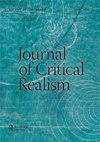Crime and the metaphysical animal
IF 2.9
0 PHILOSOPHY
引用次数: 0
Abstract
This essay considers how we talk in moral terms about crime and punishment using a framework that comes from psychoanalysis. The idea of the human as a metaphysical animal, an animal that thinks and loves, is given a naturalistic explanation in Freudian metapsychology as it was developed by Melanie Klein and Hans Loewald. While the former helps us understand the desire to punish as the enjoyable return of pain for pain, the latter indicates how mature human beings seek to pursue a sense of wholeness. This understanding of moral psychology is applied to thinking about criminal justice where three ethical stances are identified, the vindictive, the vindicative and the validatory. The vindictive and the vindicative represent a compromise formation in law which excludes a broader validatory process aimed at truthful human reconciliation.犯罪与形而上的动物
这篇文章考虑了我们如何使用来自精神分析的框架在道德方面谈论犯罪和惩罚。人类是一种形而上的动物,一种会思考和爱的动物,这一观点在弗洛伊德的元心理学中得到了自然主义的解释,这一观点是由梅勒妮·克莱因和汉斯·洛瓦尔德提出的。前者帮助我们理解惩罚的欲望是痛苦对痛苦的愉快回报,后者则表明了成熟的人类是如何寻求一种完整感的。这种对道德心理学的理解适用于思考刑事司法,其中确定了三种道德立场,报复性,辩护性和有效性。报复性和辩护性代表了法律上的一种妥协形式,排除了旨在真正实现人类和解的更广泛的验证过程。
本文章由计算机程序翻译,如有差异,请以英文原文为准。
求助全文
约1分钟内获得全文
求助全文

 求助内容:
求助内容: 应助结果提醒方式:
应助结果提醒方式:


